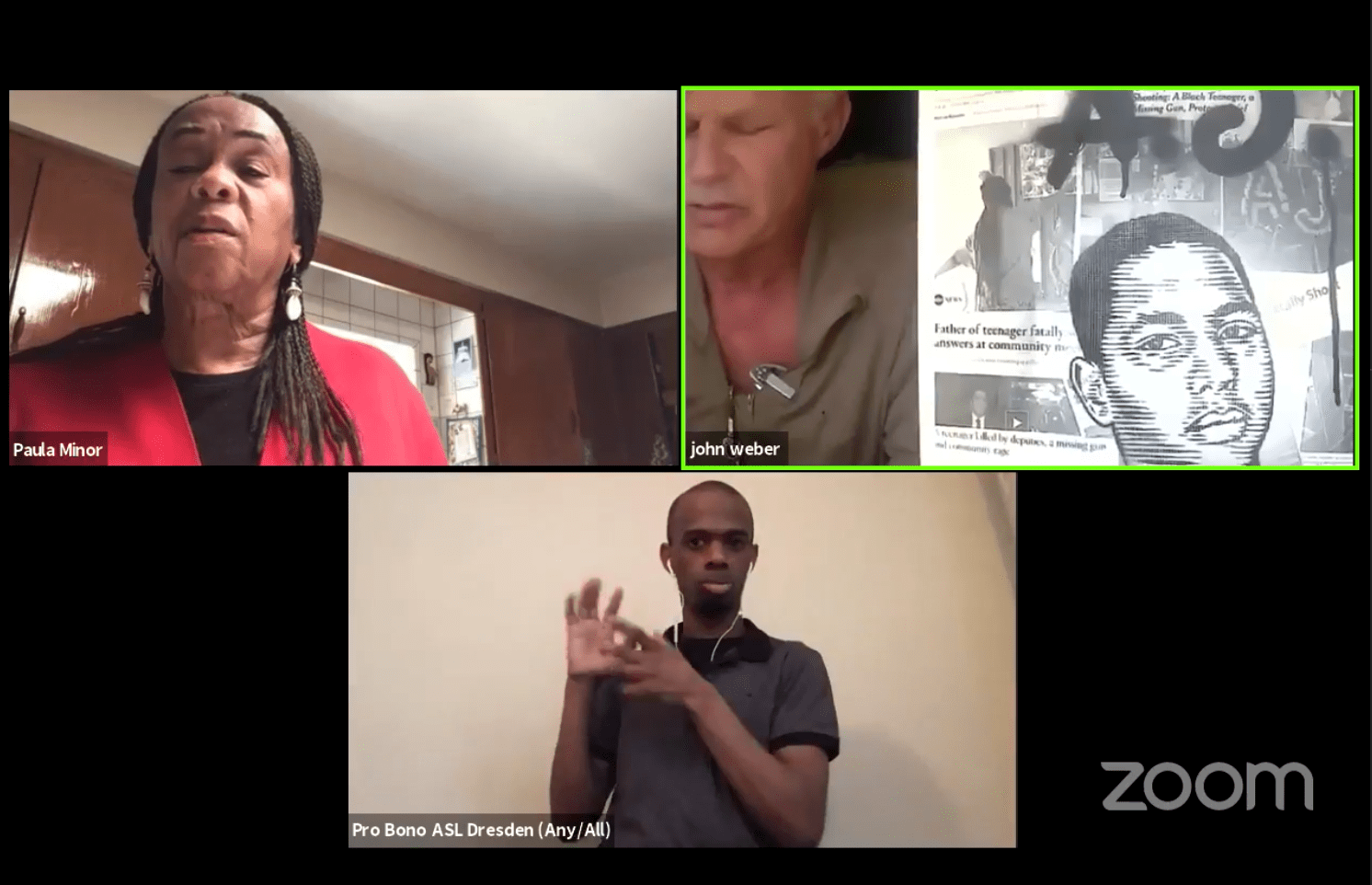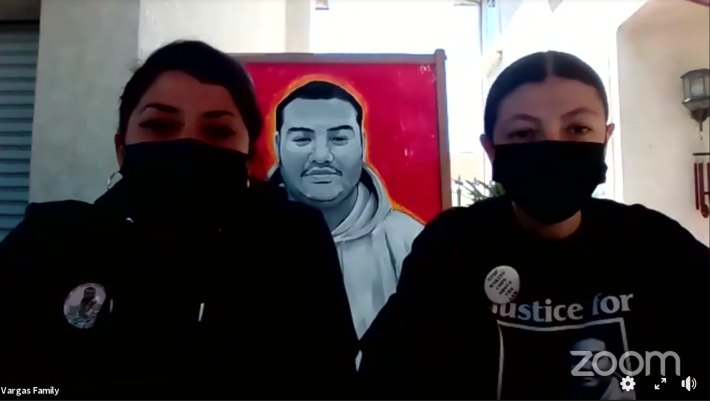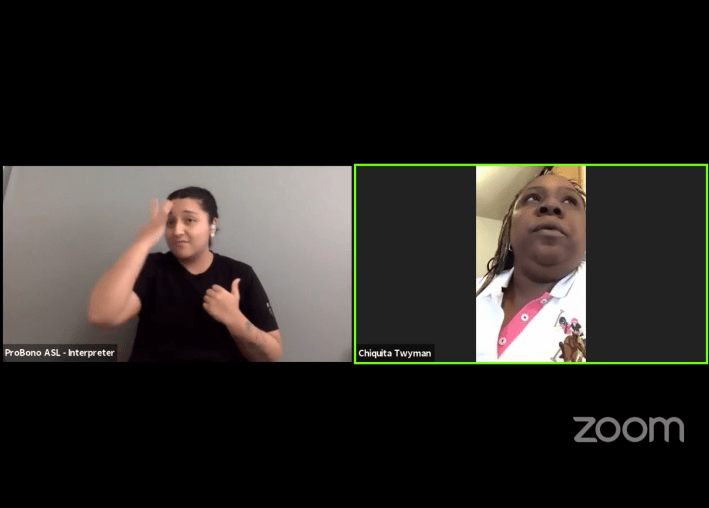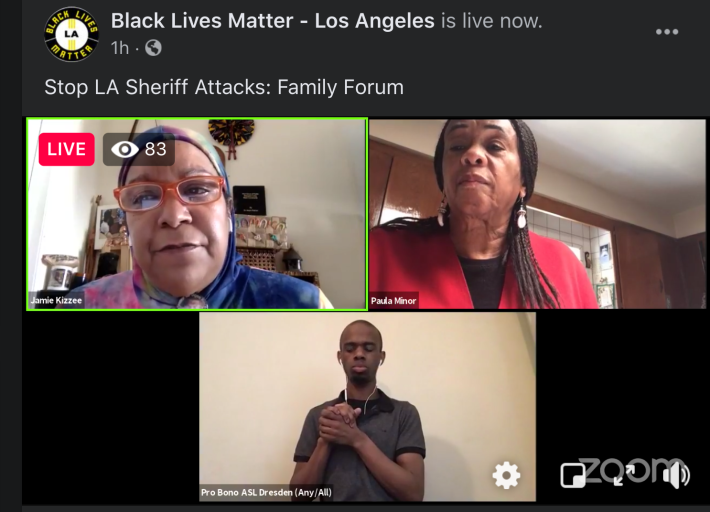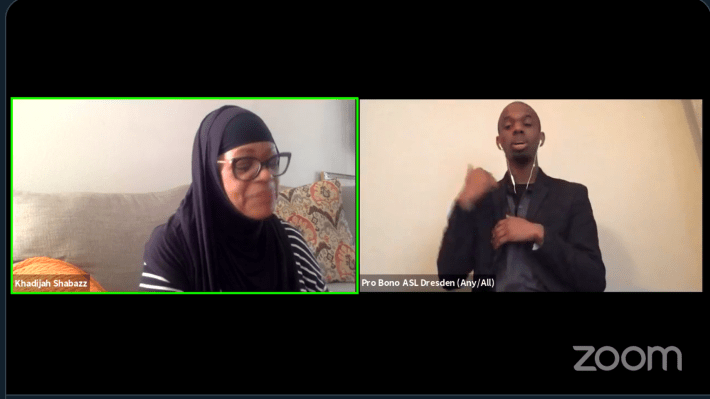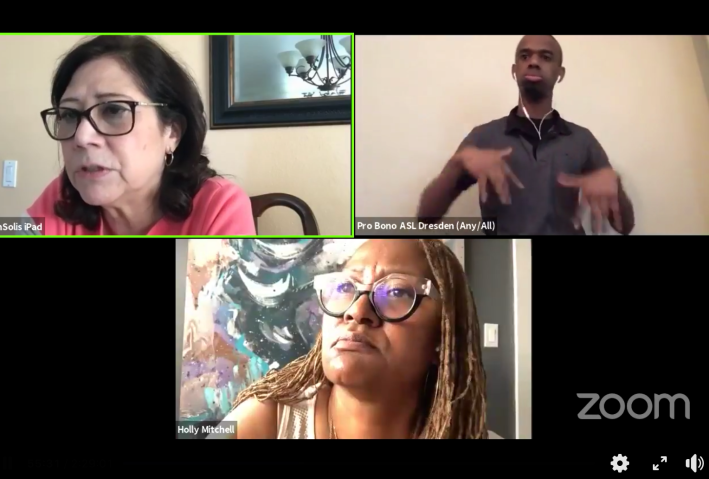For two and a half hours, County Supervisors Hilda Solis and Holly Mitchell listened to family members whose loved ones had been killed by deputies from the Los Angeles County Sheriff’s Department (LASD) describe how the pain associated with their loss was subsequently compounded by years of harassment and intimidation by LASD.
The March 27 forum, organized by Black Lives Matter-L.A. (BLM-LA) and Centro CSO, was intended to give the Supervisors a look at the lengths LASD was willing to go to limit aggrieved communities' capacity to check the department's power.
The intimidation was part of what Dr. Melina Abdullah, co-founder of BLM-LA, labeled a “triple assault” on the community. Not only had these families experienced the “theft of the body” (the loss of their family member), she said, but they had also had to witness the assassination of their loved one’s character as officials worked to justify the killing. Finally, the criminalization of the families, she said - “the harassment, the trauma, the terrorism that is exacted upon [those] who dare to speak on behalf of their stolen loved ones but also on behalf of the communities that they seek to protect from further police violence” - had worked to stripped them of safe havens.
Valerie Vargas (above, left), aunt of Anthony Vargas - the 21-year-old shot in the back and head 13 times in 2018 when alleged prospective members of the Banditos deputy gang mistook him for a robbery suspect and tried to detain him - apologized in advance for any anger listeners might hear in her voice.
The consistent retaliation her family had experienced since Anthony's killing, she said, made them “feel like we’re trapped with nowhere to go.”
The more they spoke out about the inconsistencies in the deputies' stories regarding what led to Anthony's shooting and how it went down, the more encounters they seemed to have with LASD. On multiple occasions, members of the family had been followed or pulled over and forced to sit in the back of a patrol car long enough to make them late for work. Vargas herself said she had been followed by deputies from East L.A. all the way to her job in South L.A. And instead of backing off after the airing of a CBS investigation into the deputy gangs (which the Vargas family participated in, below, and here), five units had shown up across the street from Stephanie Luna's home (also an aunt of Anthony, at right, above) while family members were participating in a Clubhouse conversation with the ACLU. Among the responding deputies was Jonathan Rojas, one of the two deputies involved in Anthony's death.
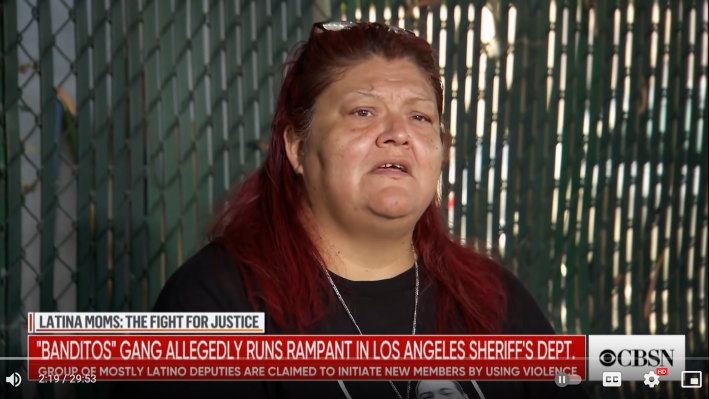
Having to fight so hard for justice had robbed them of time to grieve, said Vargas. And the constant presence of deputies in their space - including commenting on their social media posts about Anthony - was asphyxiating. “We feel like we have no sense of security walking or driving in the streets that we grew up in...the streets we raised Anthony in," she said. Feeling like they had to document it all just in case something happened to them had only added to their sense of paranoia.
Meanwhile, deputy Nikolis Perez, who would go on to kill 25-year-old Jorge Serrano just a few months after killing Anthony, has since been promoted to the rank of training deputy.
"We're not living our lives to live any more," Vargas concluded before turning to Solis and Mitchell and asking, “What can you do to protect families?”
_________
Vargas wasn't the only one pleading for more tangible changes in policy and practice. Those echoing her concerns offered up their own traumatic experiences, speaking to the myriad ways harassment had worked to steal their peace and why it was so urgent that there be real change.
Chiquita Twyman, the sister of Ryan Twyman, said the killing of her brother - the unarmed 24-year-old father of three that deputies fired 34 rounds at in June of 2019 while they were supposedly executing an arrest warrant - was an outgrowth of the harassment he had endured for years as a young Black man coming up in Compton.
Ryan and Daimeon Leffall had been sitting in Ryan's vehicle in a residential parking lot when deputies approached with their guns already drawn. Then one of the deputies opened the back passenger side door, opening fire at him when Ryan panicked and tried to drive away.
The opening of the car door was the kind of invasive, deliberate escalation that mirrored the way deputies regularly harass folks in the community during investigative stops, as seen below, in the assault of Jesus Medina in Lynwood last year...
...and in one recorded by Ryan's friend, rapper 1TakeTeezy (below), the same month Ryan was killed.
Teezy had been sitting in front of his residence when deputies pulled up and immediately began reaching inside his vehicle. There was no cause, but they threatened to bust his window anyways. Aware of his rights, he refused to get out of the car, even after deputies took his license and told him they wouldn't give it back unless he got out.
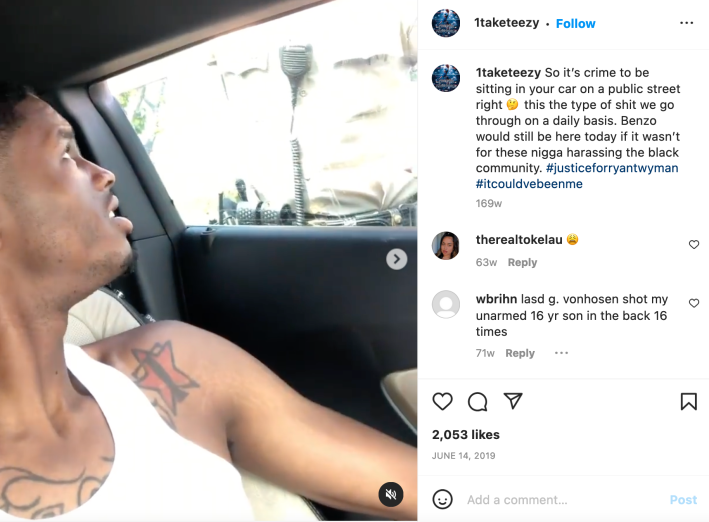
Teezy later told Next Wave Up radio (below, at 8:06) that after threatening to run the plates of every car in front of his residence, the deputies got fed up and threw his license in the street.
Prior to harassing him, he said they had been hopping out on people up the street for no reason. It was why he started recording - he knew he was next. Dayreezyy (of NWU radio, in the green hoodie) concurred, saying the sheriffs were worse than gang members - aggressively demanding to know where you were going and what you were doing in certain neighborhoods without having a reason to engage you.
"Most of the time I get pulled over, the question ain't even 'license or registration'," says Teezy. "It's 'Can you get out of the car?'...and 'Let us search your shit.'"
It was entirely likely, in other words, that Ryan had not been informed they were trying to serve a warrant on him, if that was in fact what deputies were doing.
"They's just so comfortable at opening your door up," Teezy says below. If deputies had just followed proper procedure, he speculated, Ryan might still be alive.
The violent way in which deputies engage people creates situations where they feel entitled to shoot folks - effectively because they know they can later claim they felt threatened.
And now that aggressive kind of harassment has been transferred onto Ryan's surviving family members, according to his sister, putting at them greater risk for also being seen as a threat in need of neutralization.
Deputies drive up and down past her aunt's home on 134th, they threaten to ticket the cars in front of her aunt's driveway even though she owns that property, and they make obscene gestures at her and other family members. Similar to what Vargas recounted, Twyman said her family was also regularly followed by deputies. They have been pulled over, put in the back of patrol cars while deputies searched through their vehicles, and released with no ticket after being told, "Oh, we know who you are; [we] know who you're related to," she explained.
“I’m overwhelmed with how we are treated when we’re the ones who lost a loved one," Twyman said of deputies showing up at Ryan's funeral, at his memorial services, and even at a birthday celebration in his memory. Meanwhile, two and a half years on, the family doesn't even know the names of the deputies that killed him.
“Can we at least have that much respect?” she asked.
John Weber, the father of Anthony "A.J." Weber - the unarmed sixteen-year-old killed in Westmont in 2018 after deputies presumed him to be the man brandishing a weapon that they had gotten a call about - said deputies have searched his family's home multiple times since A.J.'s death. Deputies also lurk around his recycling business, intimidating potential customers and harassing another of his sons that works there, he said. And they regularly pull his children over and make them get out of the car at gunpoint.
They "do it over and over again - they don't stop" because they know that the families are powerless, he said. There is nothing the families can do to push back that won't invite more retaliation.
LASD has effectively proven that by harassing them at home, despite it being just outside of LASD jurisdiction, and by getting LAPD in on the act. See video of the phalanx of LAPD officers that showed up to search the Weber home. The first time they came, it was to look for security footage of a possible murder suspect in the neighborhood. The second time, a year later, it was to look for a man with a gun they said might be hiding inside, though officers let an elderly, bedridden member of the family remain in bed (and presumably in the line of fire) while they searched for this potentially armed and dangerous person.
There was no man to be found, and none of the surrounding homes were searched. Instead, LAPD had the family's cars towed from the back alley.
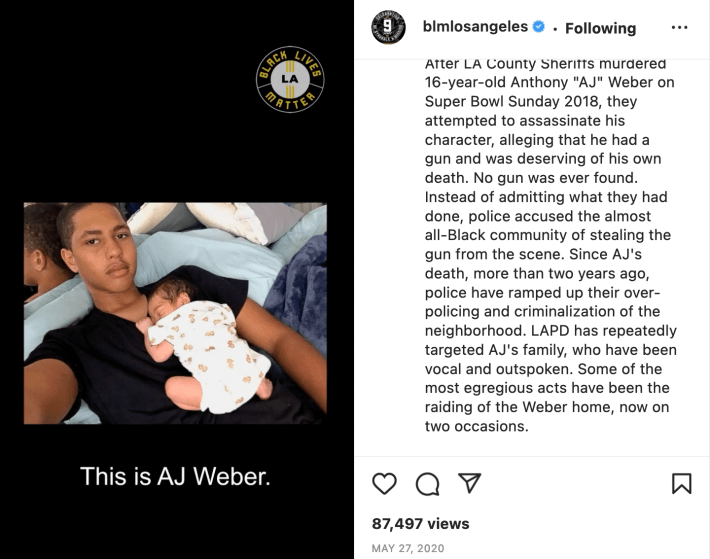
The testimony of Jamie Kizzee, cousin of 29-year-old Dijon Kizzee - killed in Westmont last August after deputies spotted him on his bicycle and chased him down to conduct an investigative stop - also spoke to LASD's influence on other departments. Just three months after Dijon was killed, Kizzee said, instead of two probation officers showing up at her door to perform the same house check they'd performed for two years for her son, they rolled up ten deep. One officer tried covering her doorbell camera, while others were seen with their hands on their pepper spray canisters or service weapons. "I wonder which hand he's gonna use when my son open that door," she said of her fears officers would immediately assault the young man.
Then she heard one of the officers loudly announce that they had cameras - something that indicated they were prepared to be met with violence of some form from the family.
She grew so concerned that she instructed her son not to open that door - despite knowing that such a decision could open him up to more harassment and penalization, if officers were to declare he was in violation of his probation.
She has it all on camera, she said. But what has changed in the intervening months?
For Khadijah Shabazz, who said she first heard the chant, "I Can't Breathe" after LAPD hogtied Tracy Mayberry and beat him to death in 1991, and whose son, Dana Malik Young, was gunned down by LASD at the end of a chase last October, the answer was "very little."
She was exhausted from being subjected to the "triple assaults" Abdullah spoke of for over 30 years. "I don't have another life to give. I don't have any more breaths to take. I don't have any more hashtags. I don't have any more energy to be marching with my fist up in the air [only] to come back to the same thing," she declared. "Right now, it needs to be all broken down, torn down, and started all over again."
Just electing another sheriff changes little if the policies that allowed for these abuses to endure are not addressed, she said.
_________
Still, for the families who have so often felt alone in their struggle for justice, the participation of supervisors Solis and Mitchell - and the frank language with which both women have consistently called out the bias and brutality that characterizes the history of policing in their East and South L.A. communities - was welcome.
Sadly, as Abdullah noted, even just hearing the supervisors repeating the names of those lost out loud was meaningful. “One of the things that we’ve seen as the lives of our people are stolen is they become hashtags and statistics," she said. "Very rarely do elected officials actually say their names and acknowledge their lives."
Addressing the impunity with which LASD has operated, however, will require so much more. As the sheriff is an elected official, it is difficult for other electeds to intervene, even when the need has long been clear.
It took over two decades of the ACLU monitoring of the jails and thousands upon thousands of complaints from both those abused by deputies and witnesses to the horrific abuse and cover ups for federal officials to launch an investigation into LASD in 2010. And true to form, once LASD leadership was made aware of that investigation - when an inmate-turned-informant for the FBI was caught with a cellphone in 2011 - sheriff’s officials decided moving him from place to place and changing his name to hide him was the best course of action. Though then-Sheriff Lee Baca and former Undersheriff Paul Tanaka were eventually convicted of obstruction of justice (Tanaka was also convicted of conspiracy), abuses within the jails remain rampant and the deputy gangs that perpetuate that corruption remain intact.
Last year, after Compton Mayor Aja Brown was pulled over under false pretenses, ordered out of her car, and searched for drugs and weapons while her husband and infant daughter watched, she openly called for the Attorney General to launch an investigation into both the Compton station and the Executioner's deputy gang there. She minced no words, saying they had terrorized the community for too long and had always managed to cover their tracks. Outgoing Attorney General Xavier Becerra finally did open a civil rights investigation earlier this year, but it is described broadly as looking at the constitutionality of LASD's policing and is not specific to a station or the issue of deputy gangs.
More recently, it took the combination of a California Supreme Court ruling, a new law aimed at police transparency, and a lawsuit from the Los Angeles Times for the public to begin to get a glimpse into why 300 deputies are listed as having a history of misconduct that could damage their credibility in court.
The sheriffs also have a half-century-long tradition of intimidating their own into silence via at least eighteen deeply entrenched deputy gangs found throughout the county, including in the jails. In addition to creating a hostile environment for their colleagues - see the recent lawsuit levied by eight deputies naming two commanders, three captains, two lieutenants and 45 total deputies - the gangs’ presence, “foster[s] a culture that resists police reforms, such as community policing and constitutional policing, by encouraging and even celebrating aggressive tactics and excessive use of force against minority communities,” according to a report by the Center for Juvenile Law & Policy at Loyola Marymount. [See also Cerise Castle’s excellent series at Knock L.A. detailing the violent history of those gangs and the punishments exacted upon the communities they are supposed to serve. See the essential database of deputy gang members Castle compiled here.]
For his part, Sheriff Alex Villanueva has denied deputy gangs control any station. In the wake of the announcement of an investigation into the department, he even went so far as to post a recorded statement from what appears to be an alternate universe, where he encourages deputies to avoid joining gangs because "we want to better align ourselves with the public's expectations." He also goes on to say he's never seen groups of three or more officers doing anything other than being social, and argues lots of people have tattoos and join groups for fun.
For her part, Solis said the issue of deputy gangs - and particularly the activities of the Banditos, the gang operating out of the East L.A. station - was one of the first to cross her desk when she took office in 2014. It was also one of the reasons why she, together with then-supervisor Mark Ridley-Thomas, had authored the December 2014 motion that led to the creation of the Civilian Oversight Commission (COC).
But as Solis acknowledged, institutionalizing justice takes real time and effort. The first set of COC commissioners would not take their seats until the end of 2016. Since then, they’ve battled openly with Villanueva, who has repeatedly thwarted their efforts to hold him accountable for a range of issues.
Even after the passage of Measure R last year, which purported to give the oversight commission subpoena power, Villanueva has repeatedly flouted their requests.
He has also gone on the offensive. He opened a criminal investigation into Inspector General Max Huntsman in 2019 after Hunstman's office obtained internal documents (including personnel files for a problematic deputy that Villanueva had rehired) that LASD had refused to hand over. And he harassed former L.A. County chief executive Sachi Hamai, publicly claiming she had denied first responders paid sick leave in a pandemic - a false allegation that resulted in her being targeted with threats.
He has also publicly lambasted both Solis and Mitchell for calling out the brutalization of people of color by sheriff’s deputies. During a live broadcast on social media, he called Solis “la Malinche,” a slur meant to malign her as a “traitor” or “sell out," in the wake of concerns raised about the killing of 18-year-old Andrés Guardado (shot five times in the back as he knelt on the ground) and the involved deputies' alleged ties to the Compton Executioners gang. A few months later, he tweeted taunts at Mitchell, suggesting she was ignorant for referring to law enforcement as “the men and women of blue” when the then-state senator said she hoped the COC’s decision to explore ways to remove him from office would send a signal that there was a deep concern about how he was managing the department.
Hey @HollyJMitchell , if you’re going to run for the @LACountyBOS and applaud for calls of my resignation, maybe you should at least educate yourself as to what color uniform my deputies and I wear, it’s tan & green (not blue).#FactsMatter #PublicSafetyFirst #Transparency pic.twitter.com/q9Sqy5nEFI
— Alex Villanueva (@LACoSheriff_33) October 22, 2020
Those personal attacks seem only to have made both Solis and Mitchell more resolute in their determination to speak truth to power in this case.
“The sheriff’s department we know is a violent organization in many ways - retaliation, harassment, I’ve heard it time and time again,” said Solis. And "we have someone at the helm there that doesn’t have respect and is, in my opinion, part of the problem...He's taken his authority and abused it."
Referencing the arguments made by some of the family members, Mitchell was no less blunt, lamenting the extent to which the tax dollars of Black and brown people essentially go to funding services that both make them feel unsafe and are actively wielded against them. "We want to stop being murdered," she said. "I don't want a Sheriff's Department riddled with white supremacist ideology and people who have a true gang mentality" and who prioritize protecting their own to such a degree that they "feel that...they are above the law."
As state senator and budget chair, she said, she had previously voted to fund various forms of training for officers. But the time had come to acknowledge that "we can't train racism out of people." She now wanted to see more effort put into screening those seeking to go into policing in the first place. She said she also wanted to see more resources directed at strengthening social safety net infrastructure, including investments in alternative responders, services, and unarmed "empathetic, culturally competent people" that could be called upon in crises.
Solis concurred, saying she wanted to see more services for the families. She also said she hoped to work more closely with the advocacy groups that were getting the message out there about these human rights abuses.
Given the limited power the board of supervisors had over the sheriff, she said, it was imperative that they all work together to leverage their voices where they could. Whether it was continuing to educate the public about these abuses, working with the D.A.'s office, empowering and supporting advocacy groups, or attempting to work through the legislature to build in oversight mechanisms, both said, there was much work to be done to exact real change.
But both pledged their commitment to the long road ahead. After thanking the families and acknowledging their frustration at not having been heard for so long, Mitchell said, "Don't give up on me. Don't give up on the process. And please know that I'm not gonna give up either."
_________
We were unfortunately unable to fit in all of the families' stories above. Please find a recording of the full forum below.
